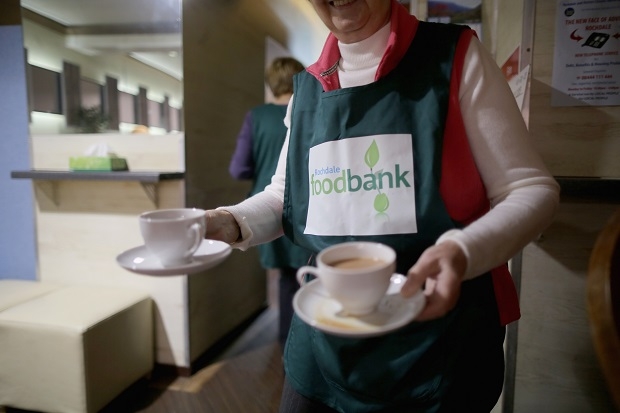Despite the stream of very good economic news (as described by Fraser and James), you won’t catch ministers saying that the crisis in living standards is ‘over’ because there is plenty of evidence to the contrary.
The Trussell Trust, the Christian charity, has today published new statistics on food bank use. The headline figure is shocking: “913,138 people received three days’ emergency food from Trussell Trust foodbanks in 2013-14 compared to 346,992 in 2012-13”. The trust says that this is merely ‘the tip of the iceberg’ because the figures do not account for other foodbank providers. There is also, the trust says, no way of estimating how many people are too ashamed to use a foodbank and prefer to go hungry instead.
There is some doubt about the accuracy of the Trussell Trust’s statistics, which are vague and may have double counted users. There is also doubt about the validity of comparisons of foodbank use extending back to 2000, when statistics were even more vague. There is no doubt, however, that demand for foodbanks is high. That fact has opened a political battleground.
600 religious leaders – including more than 40 Anglican bishops – have written a letter to the leaders of the three main political parties. They describe the situation as ‘terrible’, and urge the leaders to ‘begin rising to the challenge of this national crisis’ by engaging with the newly created all-party parliamentary inquiry into the causes of food poverty and hunger.
The leaders will, in all probability, do so. Foodbanks are a social good that work to negate the effects of social ills. There is nothing to be gained by ignoring them and the reasons for their existence.
A more immediate political question is: to what extent will the statistics shape the welfare debate in the run up to the general election?
It seems that recent welfare changes have contributed significantly to this upsurge in foodbank use. A huge proportion of respondents (83%) to the Trussell Trust’s enquiries said that benefits sanctions (for example, when a job seeker has had their allowance temporarily withdrawn after missing a job interview) had forced them into the arms of the charity. Benefits changes (20%) and low income (17%) were the other major stated causes.
2013 was a difficult year for those who depend – both to a lesser and greater extent – on welfare because so many of the government’s reforms came into force that year. The changes are designed to instil a work ethic in people for whom work is not second nature. Those who fail to comply face sanctions.
One can accept that sanctions are necessary – and perhaps even desirable if they make people more employable in the long run – but does the system have to be this punitive? Liza Cucco, the manager of a Hackney food bank, told the BBC: ‘We’re often surprised by the length of sanctions people get. If someone is late for an appointment, I’m not sure it’s reasonable to block their payments for four to six weeks.’ That might be an exaggeration; but, nevertheless, there is reason to examine and debate the subject in some depth.
The Department for Work and Pensions is well prepared for an onslaught. Spokesmen have been ubiquitous this morning; emphasising that the historic rise in employment proves that the policy is working. Ministers and aides make no secret of the fact that this is a long process; give it time, they say. They also say – and not without cause – that this government has increased demand for foodbanks by enabling job centre staff to refer claimants in need to foodbanks; an example, they say, of how the coalition has made the welfare system more responsive. Additionally, it is often said that cutting taxes for the low paid is helping people to make ends meet. The local elections will see a variation on this theme as the Tories campaign for lower council taxes.
Labour’s position – insofar as it has one – is not straightforward. The party has accepted that welfare reform is necessary. Yet we know very little about the policy package. Labour’s response to these and other foodbank statistics may tell us more about its wider intentions on welfare. Will it seek to be a softer version of the coalition? (Such a thing may, of course, be impossible in practice.) Or will it revert to type?






Comments